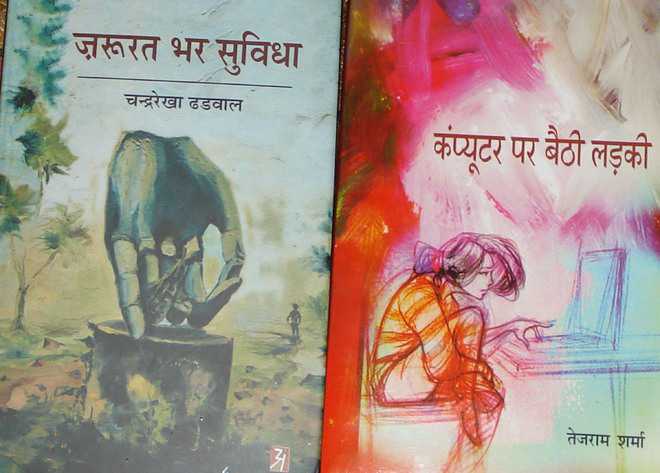Shriniwas Joshi
I received two Hindi poetry books through post, one "Zaroorat Bhar Suvidha" by Chandrarekha Dhadwal and the other "Computer Par Bethi Ladki" by Tejram Sharma (See photo). Chandrarekha has retired from Government College, Dharamsala, as Head of the Hindi Department. She had been writing since long and writes well. "Zaroorat Bhar Suvidha" is her maiden anthology of 82 poems, published by Antika Prakashan, Ghaziabad, costing Rs 250 only. She has divided the book into two sections; 37 poems under the section "Zaroorat Bhar Suvidha" and the remaining poems under the section "Roz Hi Mein Sochati".
I find little difference in the poems in the first and second sections. The stream of feminist activism, a strong point of Chandrarekha, flows in the poems of both sections. With no foreword, the author starts the book with poems. I believe that she has faith in her poems and that faith oozes out in the "let the poems talk" style.
I am quoting from poems in the first section. Her grandmother tells her, “Doodh milaa Besan mal gaalon par/ Noor tapkegaa/ hans kar le jayegaa koi Pardesi.” Her mother also advises her. These ‘do’s’ make her feel like that pot which got shape in the spinning-wheel of a potter ultimately to be sold in the market, “Kumhaar ke Chaak par/ Chadhaa Bartan/ Chil-chil kar/ Kat kat kar bantaa sanwartaa/ Haat bazaar mein/ Bik jaane ko tatpar.”
And here the author frankly tells the man that love has the same meaning for both men and women. “Maatra purush ho jaane se pyaar/ Tumhare liye adhikaar aur mere liye anukampaa nahin ho jaataa” Chandrarekha has raised a very valid question in a poem taken from the second section, “Sab gharon mein/ Hoti hai/ zaahir yaa nahin-zaahir si/ Ek lakeer/ Jiske bheetar rehnaa/ ekmaatra vikalp/ Aurat ke liye.” Why is it that a woman has no alternative but to be a housewife? The feminist in Chandrarekha revolts against men enjoying the biased status, privilege and power compared to women. In a poem, "Aurat ka kya?", she feels that the man gets what he likes and wants, while the woman does several chores also attends Bhagwat Paaths and does Kirtan and ultimately the life eats her away.
A woman, she says, “Ise manaate/ Use patiyaate/ Bhagwat sunte/ Kirtan karte/ Jee jaati hai.” You are right Chandrarekha; it still is the man’s world. We need poets like you who could say, “Buckle up Men! Take your guard; I’m coming.”
Tejram Sharma is an old horse in poetry. "Computer par bethi Ladki" is his seventh book on poetry. It has 79 poems and published by Nilimaa Prakaashan, it costs Rs 350 only. I am not pointing out the spelling mistakes but there are several in this anthology. Tejram, I feel, did not pay heed to it. The girl (symbol for womenfolk) working on computer wants to forget the miseries that the society had been regularly hurling on her and wants to start anew, “Woh apne ek hi aadesh se/ Mitaa denaa chaahti hai inhen/ Computer par bethi ladki/ Screen par/ Ek nai ibaarat likh rahi hai.” He, in "kahan se shuru kartaa", wants to write a "nai ibaarat", may be for a fresh span of life, but he is in a quandary "Where to start it from"? The poem exemplifies that the questions tell us more than the answers.
Two poems define poetry as “kavita kehti hai/ mujhe mehsoos karo” and "kitnaa bi ghanaa bune/ kavitaa nikal hi jaati hai/ shabdon ke jaal se”. Enjoy the beautiful use of "baang dena" (to crow) in this line, "pratham baang deta sheet prabhaat" or alliteration "dhoop dhuniye si dhunti hai is dhundh ko". I appreciate Tejram for making the poems in this book more comprehensible and not somewhat heavy as are some of his earlier poems.
Shriniwas Shrikant, a poet of standing, writes for him, “This poet from the mountainous village beats the time-gap and lives in his original memories while the multi-directional brushstrokes in his poems depict his sensitiveness.” Deodar is our state tree and both poets have shown their love for it as one writes "Deodar mere Pahaar ke", the other writes "Barf mein Deodar" and "Deodar".
Tailpiece
“Poetry is plucking at the heartstrings, and making music with them.”
– Dennis Gabor
Unlock Exclusive Insights with The Tribune Premium
Take your experience further with Premium access.
Thought-provoking Opinions, Expert Analysis, In-depth Insights and other Member Only Benefits
Already a Member? Sign In Now











